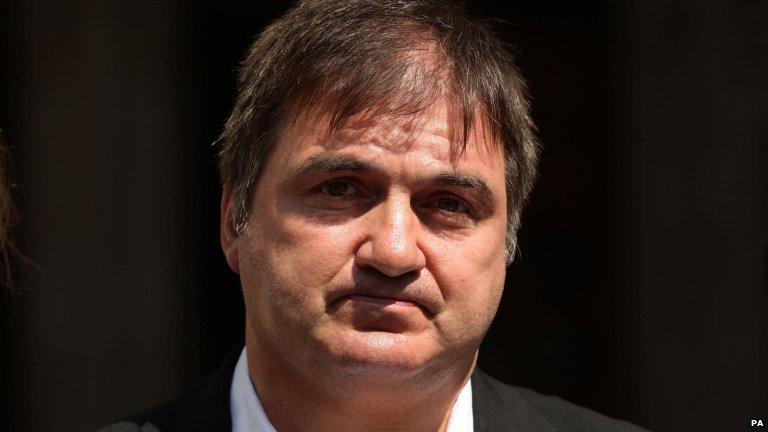Barry George in protest over compensation rules
- Published
Barry George spent eight years in prison after being wrongfully convicted of Jill Dando's murder
Barry George, the man wrongfully convicted of the murder of Jill Dando, has told the BBC that a decision not to award him compensation is "a mockery of justice".
He is among four men protesting in London on Monday against a tightening of the criteria for compensation in so-called "miscarriage of justice" cases.
Mr George says he "lost everything" while serving eight years in prison.
The MoJ said only people who proved their innocence could get compensation.
Mr George was convicted of murdering Jill Dando in 2001 but was acquitted of the killing at a retrial in 2008 after doubt was cast on the reliability of gunshot residue evidence.
His family has tried and failed twice to get compensation for him and are now campaigning for a change in the law.
'Hugely damaged'
Mr George, along with three other men who have had their convictions quashed - Victor Nealon, Martin Foran and James Boyle - will protest later outside a global law summit taking place in central London.
The government introduced new legislation in 2014 which made changes to the compensation scheme, creating a statutory definition of what constitutes a "miscarriage of justice".
Now compensation is only paid when the court quashes a conviction because a new fact has emerged to show beyond reasonable doubt that the applicant did not commit the offence.
In an interview with Radio 5 live Breakfast, Mr George's sister Michelle Bates said: "In the British justice system you are innocent until proven guilty.
"To say that Barry should prove his innocence after his conviction was quashed is ridiculous. There is no court in the land where you can prove your innocence.
"When you've had your whole life ripped to shreds, and you have been so hugely damaged just from being in the environment of a prison, you come out and there is no assistance given to you, no counselling.
"You have to find a way to build a life from the ashes of what you had."

Jill Dando was shot dead on her doorstep in Fulham, west London, in April 1999
Mr George described being harassed and "hounded" by the police and media since his release from prison.
"Not one police officer has come to my knowledge to my family or my legal team and said, 'We're sorry, there was a tragic mistake, we pursued the wrong person,'" he said.
He said that while he was in prison all his possessions were taken from his flat and nothing was ever returned.
He said: "I've never received a penny - absolutely nothing. If they're not going to pay you compensation for the many years they take from you, what does that say for the criminal justice system?
"It makes a mockery of justice."
A spokesman for the Ministry of Justice said: "Although it would normally be inappropriate to comment on an individual's application for compensation, our decision to not grant compensation to the named individual was confirmed as correct by the Divisional Court in 2013."
The Metropolitan Police said the Jill Dando murder case remained unsolved but any new information would be thoroughly examined.
- Published9 July 2013

- Published17 October 2014
